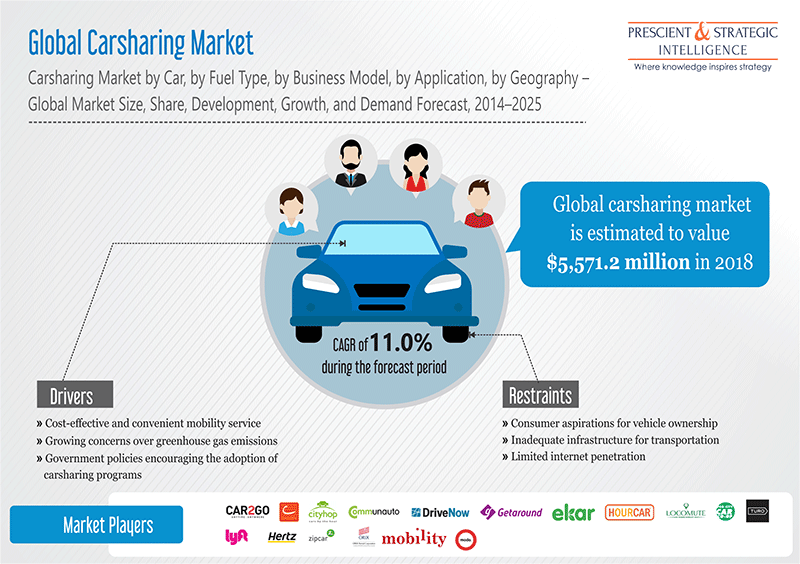The carsharing market generated a revenue of $5,571.2 million in 2018 and is estimated to progress at a CAGR of 11.0% during the forecast period (2019–2025), owing to advancements in technology, which are helping make the access to shared mobility services easy. The growing demand for convenient and cost-effective mobility services, coupled with government policies encouraging the use of carsharing programs, is the key factor driving the growth of the market. In simple terms, carsharing is a short–term rental service offered to customers at a certain charge.
Based on car type, the global carsharing market is categorized into luxury, executive, and economy cars. Among these, in 2018, in terms of volume, the economy category held the largest share in the market. This is attributed to the high fuel economy of these cars, which stimulates their demand for carsharing services. Furthermore, the rising gasoline prices and increasing environmental concerns are expected to push the demand for these cars across the globe in the coming years, as these cause less impact on the environment and are cost-effective.
Further, on the basis of fuel type, the global carsharing market is bifurcated into fuel-based and electric cars. Of these, in terms of volume, fuel-based cars dominated the market in the historical period (2014–2018) and are further projected to continue leading it with more than 95.0% share in 2025. However, growing initiatives toward vehicle electrification and environment protection are predicted to result in decreased gasoline usage during the forecast period. In addition, owing to low maintenance cost, electric cars are anticipated to observe increased adoption in the market for carsharing.
Carsharing services are extremely useful for the general public, especially for daily commuters, as without owning and maintaining cars, they can reach their destination. For users, these services are available day and night throughout the year, allowing them to use a car from anywhere, anytime. Besides, with the help of the carsharing company’s mobile app, commuters can directly avail the services and easily rent the car of their choice. The apps offer the necessary details and every assistance to users, so that they have a good commuting experience. Hence, mobile apps, providing easy access to cars as well as all the information related to the service, are taking the carsharing market ahead.
Furthermore, carsharing helps save the expenditure on owned cars, fuel, maintenance, parking, and insurance. Carsharing services require users to pay only on the basis of the time and distance the car is being driven for, along with an initial registration cost. Also, other expenses, such as those for maintenance, insurance and fuel, are borne by the carsharing service providers. Due to benefits associated with sharing services, such as cost-efficiency and easy availability, the global carsharing market is expected to grow.
Hence, with the increasing inclination of people toward convenient mobility services, the global market for carsharing is witnessing a boost.

Increasing Demand for Convenient Mobility Services Aiding Carsharing Market Growth
Posted by
Jimmy_Lecar
6 years Ago
6th June 2019
Shares
What’s your reaction?
Shares
Jimmy_Lecar

















